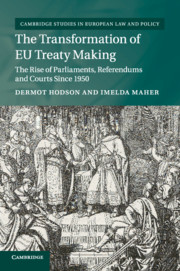Book contents
- The Transformation of EU Treaty Making
- Cambridge Studies in European Law and Policy
- The Transformation of EU Treaty Making
- Copyright page
- Dedication
- Contents
- Figures
- Tables
- Series Editors’ Preface
- Acknowledgements
- Abbreviations
- 1 The Transformation of EU Treaty Making
- 2 Two-Level Games, Two-Level Legitimacy and EU Treaties
- Part I The Negotiation Stage
- Part II The Consent Stage
- Part III The Practice of EU Treaty Making
- References
- Index
2 - Two-Level Games, Two-Level Legitimacy and EU Treaties
Published online by Cambridge University Press: 20 July 2018
- The Transformation of EU Treaty Making
- Cambridge Studies in European Law and Policy
- The Transformation of EU Treaty Making
- Copyright page
- Dedication
- Contents
- Figures
- Tables
- Series Editors’ Preface
- Acknowledgements
- Abbreviations
- 1 The Transformation of EU Treaty Making
- 2 Two-Level Games, Two-Level Legitimacy and EU Treaties
- Part I The Negotiation Stage
- Part II The Consent Stage
- Part III The Practice of EU Treaty Making
- References
- Index
Summary
- Type
- Chapter
- Information
- The Transformation of EU Treaty MakingThe Rise of Parliaments, Referendums and Courts since 1950, pp. 34 - 54Publisher: Cambridge University PressPrint publication year: 2018

